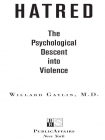Hatred, Willard Gaylin [best ebook for manga txt] 📗

- Author: Willard Gaylin
Book online «Hatred, Willard Gaylin [best ebook for manga txt] 📗». Author Willard Gaylin
Still, doctors should honor the truth, while trying to offer some latitude for hope and comfort. When we try to control or influence our patients by means that bypass their rationality, will, and volition, we diminish their autonomy. We reduce them. When they sense this, they will respond with rage.
Frustration
Anyone or anything that makes us feel less whole, less powerful, less useful, and less valued will make us feel endangered. We depend on others and the respect of others to support our self-esteem. If others indicate their contempt or indifference to us, we feel vulnerable. But it is not just in our relationships with others that we can be made to feel inadequate. Our self-confidence is equally founded on ourselves and our own performance, particularly as measured against an ideal imposed from within ourselves as well as from the environment. Anyone exposed to frustration in attempting even a minor task is aware of how quickly our irritability level can rise. And how rapidly we can convert our dissatisfaction with ourselves into anger with some other. This conversion is a step that we all experience and is crucial to an understanding of the mechanism of scapegoating that will be presented later in the book.
My own personal frustration tolerance is at its lowest when performing fine hand movements, at which I am particularly un-talented. Small parts in fine works are my particular nemesis-the tiny screw that must be positioned into the small opening under an extended ridge that is protected by a delicate filament or wire that must definitely not be disturbed. It is a situation that even in anticipation is sufficient to get my hands trembling with anticipated rage and frustration, and the trembling in turn is sure to disturb the wire that must remain inviolate for the mechanism to survive. Even in movies I find myself most anxious in those clichéd scenes where if a bomb is not defused, the good guys will be destroyed and the bad guys triumph. Such scenes inevitably produce in me a frisson of terror. It is the wise person who knows his own poisons and avoids them.
I am most tempted to enter my danger zones when dealing with electronic equipment, either in its assembly or repair. If what I am diddling with were an attempt to install or program a DVD player, the frustration that I experience has nothing at all to do with the typical image of frustration, that is, a frustrated desire . The desire to watch a movie is irrelevant. It is the evidence of my own personal ineptitude that threatens and, therefore, angers me.
What disturbs me is my knowledge that others can handle these matters quite well and that I seem to be particularly inept. The feeling of being all thumbs is not far from the feeling of having no hands. What enrages, because it frightens, is the emerging awareness of one’s own inadequacy in relation to others—relative abilities, or lack thereof, in a competitive world.
Most of us are not frustrated by our inability to climb Mount Everest, accrue a fortune, or play golf like Tiger Woods. It is dealing with the computer glitches, fixing the plumbing, or roasting a turkey that triggers frustration. The apparent simplicity of these tasks suggests that others can do them easily. Philip Roth, in his marvelously honest book Patrimony, reveals his barely constrained rage at his irritable and demanding father, rage that breaks out when his father, in a tirade against his self-sacrificing girlfriend, complains that she cannot even pick out a decent melon. Roth’s fury spills out, since he, like me, is obviously frustrated at his own inability to “pick out a decent melon,” a task that others seem to manage. Our failure is more dramatic for being so relative. If I am incapable even here, where others succeed, what does that say about the worth and reliability of myself?
We can guard against a sense of impotence by deflecting the anger from the self to others, concentrating on who created the problem rather than who it is that cannot resolve it. If the example is audio equipment that a child tinkered with and damaged, one could divert the stream of anger from oneself to the child, withdrawing the attention from one’s own inadequacy by finding a convenient, culpable target.
A more rational way to protect our self-esteem would be to avoid involvement in such trivia. Much of this is choice. Play football instead of golf. Don’t play games at all. As for the handyman or household maintenance stuff of life that confounds us, we can admit defeat by hiring someone to do it. There is no disgrace in that. We live in a world of specialized work. We don’t make our own clothes, grow our own vegetables, or hunt for our own meat. For most men “bringing home the bacon” is a metaphoric phrase that does not even involve their making a trip to the supermarket.
But what happens when we leave the world of the relatively trivial and avoidable? The learning-disabled child cannot avoid schooling, and at a time when we were





Comments (0)